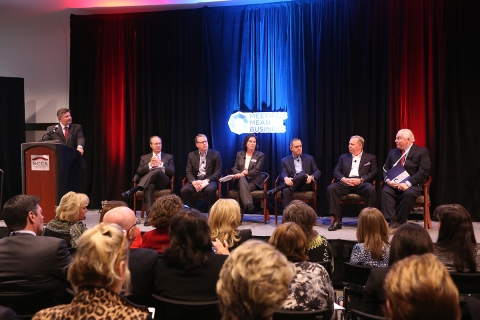Meetings, Events Industry Collaborates on Launch of "Meetings Mean Business" Campaign

It was a standing-room only at Boston’s Hynes Convention Center for a press conference during the Professional Convention Management Association’s Convening Leaders that was attended by several meetings and events industry leaders to announce the launch of “Meetings Mean Business” designed to emphasize the value of face-to-face.
The campaign’s focus is to create an advocacy and information platform that highlights the industry’s pivotal role in creating jobs, generating economic value and driving business success.
The effort to come together as a united front as an industry to rally behind face-to-face really began in 2009 in the middle of the economic recession when companies were under attack for holding meetings.
“One congo line at an IRS meeting … can do so much damage,” said U.S. Travel Association President and CEO Roger Dow. “We need to shape the story.”
With a lineup of industry heavyweights onstage at the press conference, Dow added, “It’s amazing to see all these people come together as one voice.”
The economic recession has subsided, the meetings and trade show industry still has its challenges, with government meetings currently under the Congressional microscope.
One crucial piece of information industry leaders have now, as opposed to 2009, are actual numbers that prove the value of face-to-face.
Since 2009, the meetings and trade show industry has brought in $119 billion GDP, an 8.3 percent increase in employment and 1.7 million jobs, according to Dow.
Co-chair of the “Meetings Mean Business” Coalition and President of Maritz Travel David Peckinpaugh said, “The launch of this industry-wide campaign is an exciting moment as diverse voices from across our industry unite behind a powerful, singular message to communicate the benefits meetings bring to communities, business and the economy.”
Larry Luteran, also a coalition co-chair and senior vice president of group sales and industry relations at Hilton Worldwide, said the strategy of the campaign was to get ahead of anything negative related to the value of holding events and get a positive message out there.
He added there were three main pillars to the campaign to actively engage with stakeholders, media and key policymakers:
- Creating Personal Connections: personal business at the core of every business decision, no matter what industry
- Driving Positive Business Outcomes: Meetings and events deliver profits, help win new accounts and serve as education platforms.
- Building Strong Communities: The events and meetings industry creates hundreds of thousands of jobs, generates billions of dollars of revenue and supports communities across the U.S.
To kick the campaign off, $500,000 has been earmarked to start getting the message out, along with the hiring of a marketing agency.
To ensure this is an ongoing effort and to raise more funds, a fundraising committee headed by HelmsBriscoe’s Executive Vice President Richard Harper and Steve Moore, who heads the Greater Phoenix Convention & Visitor Bureau, also was announced.
Other aspects of the campaign will involve national outreach, an industry toolkit, grassroots marketing, positive media and stakeholder engagement.
David DuBois, president and CEO of the International Association of Exhibitions and Events, said the time is now to do this kind of outreach.
Having just returned from a trip to China, he added that there are more than 125 convention centers that are currently looking at 30 percent occupancy rates in that country. “Do you think that’s not our competition?”
Deborah Sexton, president and CEO of PCMA, said, “This has been a long time coming. It’s a really great thing that it’s here. We have economic data now, and we need to support that (positive) message.”
For more information, please visit – http://www.


Add new comment